Gambling Industry Statistics
Gambling opportunities have grown immensely over the past years, making it a common practice in Canada, as seen in many others. The rise has been catalyzed mainly by new technology in the gambling sector, including sports betting and online slots.
With over 19.3 million active users, Canadians have made it a leading industry in its economy. British Columbia, Alberta, Saskatchewan, and Ontario Provinces have prompted growth in their market to reach many online gamers. Statistics show that Canada ranks eighth in global online gambling industry spending, with at least C$4bn going to offshore operators.
General Gambling Market Statistics Canada
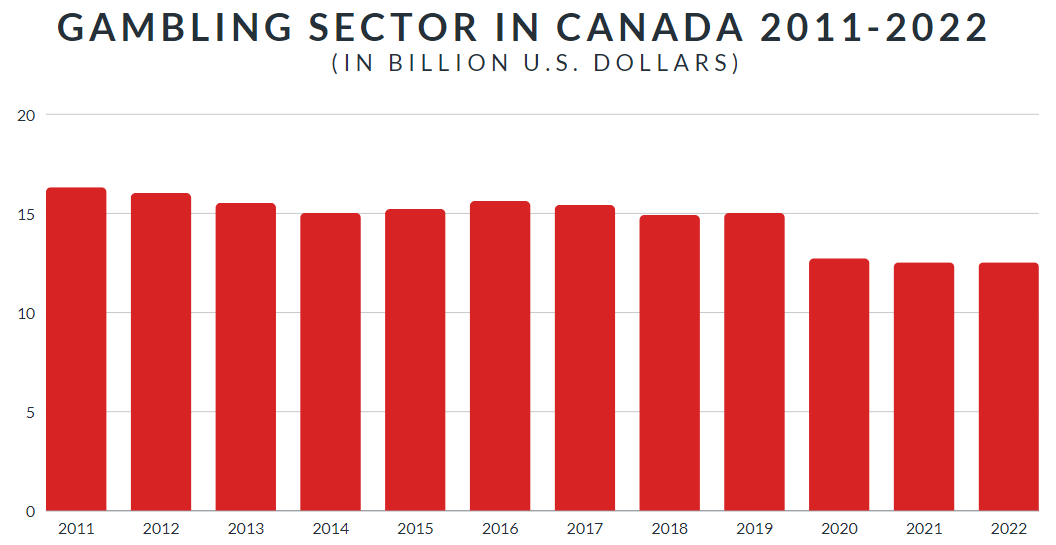
As a leading industry in Canada, online gambling shows a high flow of money in and out. In 2020, the sector had a total of $12.75 billion in market size, while in 2021, the market registered a decrease of $210 million. In the same year, the gains drawn from the Canadian casino market were $2.64b. 45% of the money came from online gamblers. It is believed that the sector could bring in higher revenue if not for the requirement for online sites to acquire licenses from the provincial government of Canada.
The sector is largely diverse, attracting numerous offshore investors that make the sector promising for the future and likely to increase income. Companies like Ontario Lottery and Gaming Corporation, IGT, and PURE Canadian Gaming, all based in Toronto, Canada, are global casino leaders. This means that the sector attracts revenue from within the country and internationally.
Casino gamers across the globe represent 26% of the total population, that stands for 2 billion and 80 million people. Regarding Canada, there are over 19.3 million active gamblers. At least 56% of men and 43% of women have participated in online gambling in Canada. The number continually increases: almost two-thirds of Canadians above 15 reported gambling in 2022. Thereby, in most states, gambling begins in the teenage years (as low as 15) and increases in the early 20s, running a risk of addiction. As players grow older, the habit tends to diminish. Many studies also show a high prevalence of gambling among certain races. Blacks record the highest number, followed by Hispanics and Asians.
Related article
Top Gambling Countries Ranked
Gambling stats show that the global gambling economy attained a market size of $230.9 billion in 2021 and is rising. Every year, it’s exceeding market expectations, and stats in various regions have evidenced this. The leading region, Asia-Pacific, recorded a GGR of $116.47bn, followed by Europe and America with €87.2bn and $29.98bn, respectively. Nearly half of the returns come from online gambling.
Macao
In China, casino activities are strictly prohibited, with most live dealer games and online gambling being outlawed. However, the city of Macao (Macau), situated in the western Pearl River Delta and functioning as a special administrative region of China, stands as a remarkable exception. Here the oversight of gambling activities is governed by The Macao Gaming Inspection and Coordination Bureau (DICJ), a regulatory body responsible for maintaining the integrity of the industry. Additionally, the DICJ supports the Chief Executive of Macao in organizing the city’s economic plans.
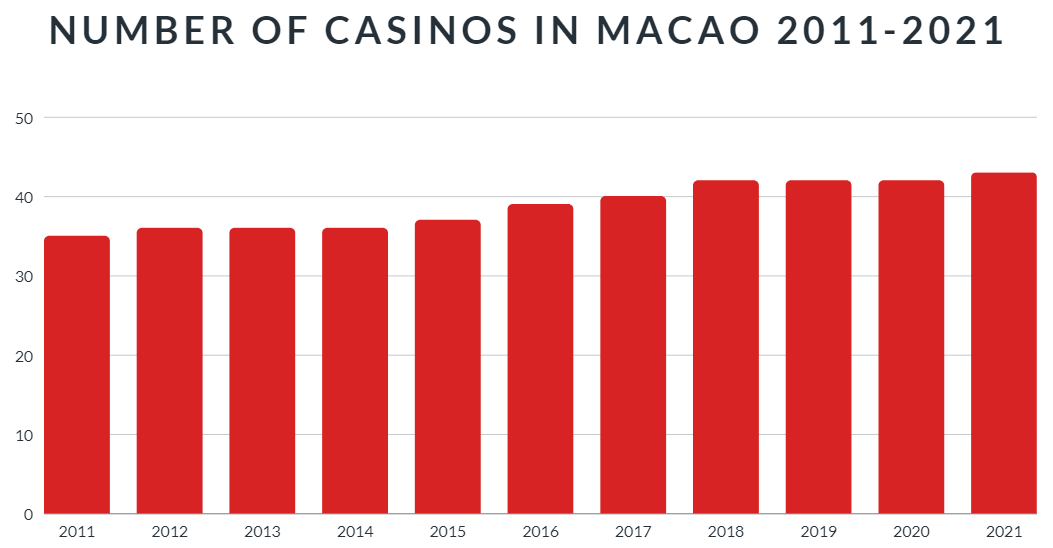
Thereby, gambling in Macao is not only legal but also forms a significant chunk of the city’s revenue, accounting for a substantial 50%. In 2018 alone, this gambling haven made up to $38 billion from 43 casinos and numerous online gaming sites. The figures have fluctuated since. With the growth in infrastructure, increasing local spending, and revenue from tourism, the gambling sector was estimated to rise higher in 2023. Monthly proceeds have been steady at 1.1% as follows:
- January – $18,674 million,
- February – $19,521 million,
- March – $17,981 million,
- April – $17,341 million,
- May – $18,389 million.
Macao has a small population of 680,000, with the average gambler age approximately 36 years old. In 2012, the city raised the minimum gambling age from 18 to 21 to make sure only qualified individuals participate in these activities. However, the monthly revenue has remained stable, showing that Macao continues to be a popular global gambling destination. It is often referred to as the “Las Vegas of Asia” due to its world-renowned casinos with a blend of Chinese and Portuguese cultures and stunning architecture.
Canada
The gambling industry in Canada has witnessed significant growth and evolution over the years. Unlike China, Canada takes a liberal approach to gambling, with the sector ranking amongst its leading sources of income. The Kahnawake Gaming Commission (KGC) is responsible for licensing and regulating Canadian online casinos.
The industry is not only a source of entertainment but also a substantial contributor to the national economy, generating employment and revenue for various provinces. Gambling statistics in Canada show that the economy makes up to $17.3 billion in revenue. In 2017, the Canadian gambling industry recorded a rise of 4.9%, with more than 35,000 gaming areas. Almost two-thirds of the population (18.9 million) in Canada from the age of 15 are engaged in gambling. The gambling data in 2019 revealed that 65% of Canadians play the lottery.
United Kingdom
The UK Gambling Commission supervises all forms of gambling activity in the United Kingdom, managing both online and brick-and-mortar casinos. In 2005 it enforced some regulatory changes driven by the government’s decision to legalize gambling that resulted in a steady development of the industry. The British gambling sector boasted over 170,000 online slot machines and 162 newly licensed online casinos, contributing to a total industry income of $15.17 billion during 2014-2015 time frame.
The majority of UK gamblers fall within the 45-54 age group with the lowest representation from individuals aged 18-24. On a weekly basis, approximately 32% of the population engages in gambling.
Australia
Australia maintains a strong presence in the gambling industry, driven by local sports funding, a thriving online gaming market, and a steady influx of Asian tourists to its land-based casinos. The Australian government has delegated regulatory authority to individual states that issue local licenses for casino operations, while Tatts and Tabcorp primarily manage lottery and sports betting.
With an 18+ age limit, the gambling community represents 80% of the Australian population. The majority of gamers fall into the 45 and above age bracket, comprising 43.2% males, 35.2% females, and 21.6% classified “others.” The country’s annual spending on online gambling totals approximately $18 billion. The figures of 2013 and 2014 unveil an impressive industry value of $116 billion.
United States of America
In the USA, gambling and betting are allowed by federal law. However, every state chooses the governing body to regulate or restrict the practice. Some of them allow separate types of gambling and betting activities to operate legally: commercial and tribal casinos, sports betting, parimutuel betting, state lottery, etc. Online casino games and online betting face bans in many states, despite classifying a lucrative industry in other countries. But the latter has a chance to be legalized, especially with the growing popularity of Daily Fantasy Sports (DFS).
New Jersey and Nevada have approved land-based casinos, and they have also given the green light to specific online casino games. In contrast, Florida and California have a vibrant poker scene, even though it is not yet legalized. Remarkably, Pennsylvania has recently made significant moves to allow both online and land-based gambling. These changes reflect the evolving landscape of gambling regulations in the United States.
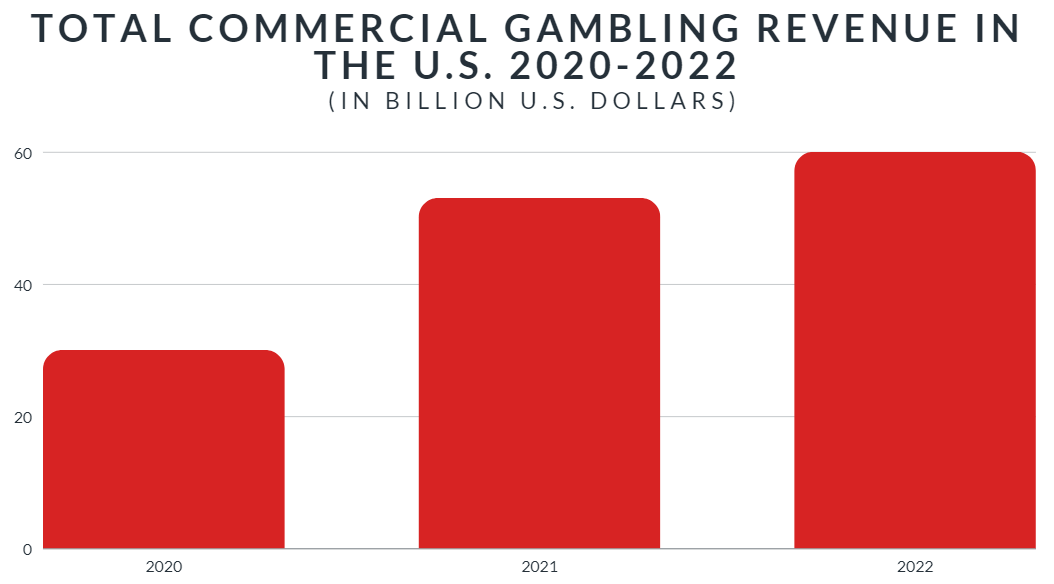
The US gambling sector boasts a substantial worth of $261 billion and provides employment for over 1.8 million people. The unregulated gambling market is enormous as well, reaching $511 billion annually in wagers, according to the American Gaming Association.
The minimum gambling age in the US stands at 21 years, with a significant portion of gamblers falling within the 30-44 age bracket. In 2010, the US counted 438 commercial casinos, that number extended to 524 in 2016 and dropped to 468 in 2022. Anticipations for 2023 represent a notable increase in online casinos joining the American gambling market, driven by legal amendments.
Interesting Data in the Gambling Sector
Figures indicate that gambling is on a constant rise, growing in popularity every day. It remains one of the most engaging industries in the global economy.
Worst players
The lowest-ranked state in gross gambling revenue (GGR) is Poland; it had a GGR of $1.81b in 2018. Australia, having one of the largest populations, bears the highest gambling losses per capita. Malta, a compact island in the Mediterranean with a small population, experiences one of the largest losses per head in gambling globally. At the same time it is home to the world renowned gambling regulatory body, as well as for some outstanding online casino sites and their affiliates.
Best gamblers
In 2021 China generated $46.01 billion in gambling proceeds – the highest recorded revenue by the country in this field. The USA and Japan followed with $40.54bn and $22.09bn, respectively. Italy had the highest gross revenue in gambling among the European states, totaling €18.1 billion in 2019. Germany and France also boasted GGRs of €14.3bn and €12.2bn, respectively.
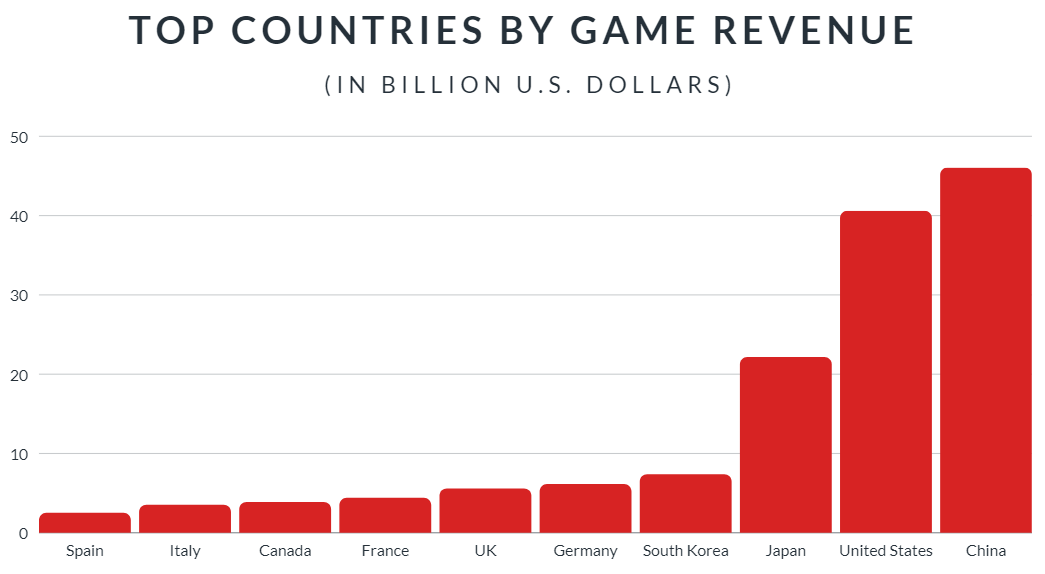
COVID-19 impact
At the outset of the pandemic, Canada, like many other countries, implemented strict lockdown measures that included the closure of physical casinos. This forced the industry to adapt quickly to the changing circumstances and to shift to online gambling activities. Many players who were previously more inclined to visit brick-and-mortar casinos turned to online platforms to satisfy their gambling needs. European data shows that the gambling market revenue significantly declined by 13% compared to 2019 due to COVID-19 restrictions.
Most Popular Casino Games
Games have experienced gradual development owing to technological advancements. That made some of them more popular than others, depending on gamers’ preferences. Other gambling entertainments, like sports betting, also have a long history and are still extremely admired among all genders and ages.

Slots: Slot games are very popular within both genders: male and female, and the current data reflects the rising in demand. According to the recent studies by Statista, nearly 50% of casino gamers in the US played slots. Survey among women who practice gambling shows that slot machines take the third place in popularity after online bingo and sports betting. It is interesting to know that mobile and online slots have produced huge wins due to their progressive jackpots. Every lucky player was granted up to $7 million over recent years.

Poker: This is one of the most renowned table games among North American players as well as African and Asian ones. The survey among men who gamble regularly shows that almost one third of them prefer poker, especially online. At the same time, less than 20% of women share this activity. Unexpectedly, the online poker auditorium is aged mostly 25-34. As for Europe, only 5% of the online gambling market is occupied by poker. On the contrary, Australia boasts a high quantity of poker players.

Lottery: In most states where casinos and old-fashioned wagering are out of law, the lottery remains legal. That might explain why it takes the second place among popular gambling activities in Europe. Canadian province Ontario finds selling lottery tickets a profitable business receiving 4000 billion CAD. The average age of a lottery player in Canada is over 55 years. Fifteen years ago a half of the USA citizens announced participating in lotteries, and the latest statistics show that the quantity of lottery-loyal players increased by 6%.

Bingo: Previously bingo was considered to be mostly female activity being practiced regularly by around 60% of surveyed women who gamble in the UK. But with the rise of online gambling, bingo managed to win the hearts and minds of more than 42% of the male audience. However, the popularity of bingo is not even among other European countries. In general, it occupies less than 5% of the market with 1.6 billion players who usually practice bingo several times per week.

Sports betting: On the contrary to bingo, betting on sport events was always seen as a male gambling activity with 73% surveyed respondents who bet online in the UK. However, now more than 40% of British female gamblers engage in sports betting too. With that adjustment, almost 60% of regular gamblers of both genders enjoy this activity. They are mostly of advanced age (55 years and over). Overall, European countries show a high involvement in sports betting with 42.5% of market share, which considerably exceeds other gambling activities. The reason lies in the local gambling restrictions and relaxations.
The table below shows the percentage share of respondents and different types of their gambling preferences by 2023:
| Age range | 18-24 | 25-34 | 35-44 | 45-54 | 55+ |
| Lottery game | 20 | 24 | 35 | 46 | 51 |
| Sports betting | 15 | 21 | 22 | 22 | 23 |
| Online slots | 16 | 21 | 22 | 16 | 11 |
| Online casino table/card games | 11 | 23 | 18 | 10 | 10 |
Mobile Gambling Statistics Canada
Canada is a technologically developed country and that results in a variety of online casino websites. The number of gambling operators increases with the quantity of active gamblers, which is anticipated to reach 20.38 million in 2027, and with user penetration being expected to grow to 51% in 2027. Byt the way, the global mobile gambling market is expected to reach $53.75 billion by 2025 and $123.6 billion by 2027. According to Statista, casino games were downloaded on smartphones and tablets 12.78 million times in 2022.
Canada’s gambling industry boasts revenue of $2.64 billion, with a significant $1.2 billion portion resulting from online gambling. This sector stands as the largest contributor to the industry’s earnings making its 45%. The growing allure of online gambling is evident, with increasing numbers that reflect a rising interest among both genders.
Among the most widespread gadgets to use for online gambling, there are personal computers, laptops, mobile phones, tablets, and smart TVs. The figures show that 55% of women who gamble online use their smartphones that exceeds the quantity of male respondents who bet on the web via mobiles.
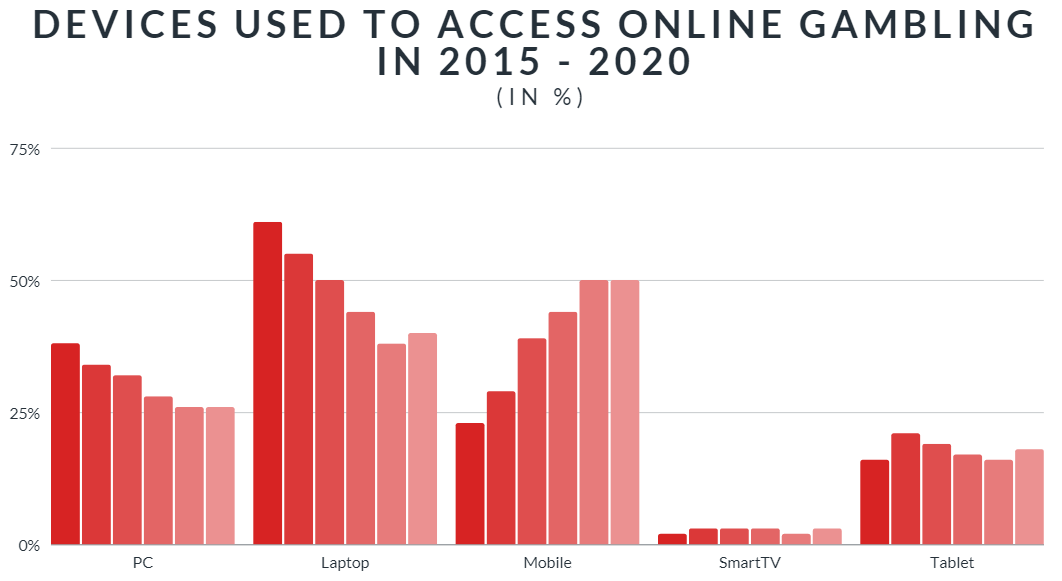
Canadians usually gamble online from 4 p.m. till 6 p.m. and from 8 p.m. till 11 p.m. Additionally, 46% of Canadians confess to spending 4-5 hours on their phones, which can increase the risk of developing gambling addictions. The research also indicates that young adults between 18 and 24 tend to spend more time gambling on their phones than those 65 and older, with 75% falling into the former category. On the contrary, bingo, known for its social appeal, gained substantial popularity among Generation Z.
Most people can easily access online casinos thanks to widespread and affordable Internet and mobile devices. If they miss the feel of a brick-and-mortar casino, live online casinos with real-time dealers are available. Looking ahead, the integration of virtual reality in online casino games is a predictable advancement that will enrich the gaming experience and make gamblers spend even more time online.
Conclusion
Gambling is a fast-growing sector, projected to top $112.09bn by 2025 and to exhibit a growth rate up to $53.75bn by 2025. Increased interest from middle-aged users and new technology developments ensure it remains part of the global economy for a long period.
Stats show that land-based casinos are gradually becoming overtaken by online and phone gambling. The convenience, accessibility, and variety offered by online casinos have made them a popular choice among gamblers globally. Features like live dealers and immersive experiences replicate the atmosphere of physical casinos, bridging the gap between traditional and online gambling.
In essence, the future of gambling is digital, marked by technological innovation and enhanced user experience, making the world of casino gaming more exciting and dynamic than ever before.

